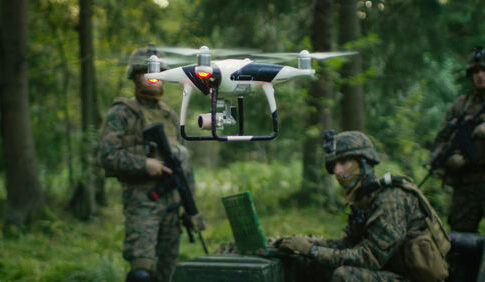As Russian drones breached NATO airspace in Poland, President Trump’s decision to downplay the incursion as a mere “mistake” has put U.S. leadership and alliance unity under the microscope—raising urgent questions about American resolve and Western security.
Unprecedented Drone Violation Jolts NATO’s Eastern Flank
On September 10, 2025, Poland’s skies were breached by a swarm of at least 19 Russian drones during a major assault on neighboring Ukraine. The violation marked the largest such incursion since Russia’s 2022 invasion of Ukraine and sent shockwaves through NATO defense circles. Polish and NATO fighter jets were scrambled, resulting in the interception and destruction of several drones. For the first time in years, Poland invoked NATO Article 4, compelling urgent alliance consultations as border communities braced for further escalation and property damage was reported in the affected region.
This unprecedented act of aggression drew immediate condemnation from Polish officials and NATO leadership, who classified the incursion as a deliberate provocation and a test of Western defenses. In response, Germany, France, the Netherlands, and the Czech Republic pledged additional air defense assets and fighter jets to reinforce Poland’s security. NATO leaders described the event as “reckless behavior” from Russia, heightening fears of a broader regional conflict. The United Nations Security Council convened an emergency session at Poland’s request, emphasizing the gravity of the incident for European peace and stability.
Trump’s Response Sparks Alliance Friction
Contrasting sharply with the alarm echoed in Warsaw and Brussels, President Trump offered a markedly different tone. He publicly suggested the drone incursion “could have been a mistake,” downplaying the threat and urging caution against overreaction. This stance drew immediate ire from Polish officials, who insisted the attack was intentional and aimed at testing NATO’s resolve. Trump’s remarks also triggered unease among NATO allies, raising concerns about America’s future leadership role and reliability in the alliance at a time when unity is paramount for deterring Russian aggression.
The diplomatic fallout from Trump’s comments exposed deeper divides within NATO about the best course of action. While frontline states like Poland demand robust deterrence, some Western voices—echoing Trump—urge restraint to avoid further escalation. This divergence underscores the ongoing tension between those prioritizing strong defensive measures and others wary of being drawn further into direct confrontation with Moscow.
Escalating Risks, Questions of Readiness, and the Path Forward
The drone incursion comes amid a surge in Russian aerial attacks on Ukraine, with hundreds of drones and missiles launched in recent days. Prior violations of NATO airspace by Russian drones had been limited in scale; this mass incursion shattered prior precedents and raised the specter of accidental or intentional escalation. Polish President Karol Nawrocki framed the episode as an “attempt to test the mechanism of action within NATO and our readiness to respond.” NATO Secretary-General Mark Rutte characterized the incident as “not isolated,” warning that such acts could become more frequent and dangerous if left unchallenged.
Military analysts and European leaders now question the effectiveness of NATO’s air defense integration and the alliance’s overall preparedness for hybrid threats. German Chancellor Friedrich Merz called the incursion “a very serious threat to peace throughout Europe,” highlighting anxieties about gaps in collective defense. Meanwhile, Russia’s government denied any intent to target Poland, while Belarus suggested the drones may have been diverted by electronic warfare. Investigations are ongoing, but the incident has already prompted increased defense spending, heightened alert status across NATO’s eastern flank, and renewed debates over alliance solidarity versus national interests.
Alliance Under Strain: Implications for U.S. Leadership and Conservative Values
For American conservatives and constitutionalists, the incident and its aftermath raise pressing questions about national sovereignty, border security, and the enduring value of strong alliances. Trump’s approach—emphasizing caution and downplaying escalation—may appeal to those wary of entangling foreign commitments. Yet critics argue that minimizing direct threats to NATO partners could erode U.S. credibility, embolden adversaries, and undermine the very alliance that has preserved Western security for generations. The need for clarity, resolve, and robust deterrence is urgent, with the security of American families and the future of constitutional government hanging in the balance.
Liberals are blood-thirsty and want war.
Trump Downplays Drone Incursion Into Poland As Likely 'Mistake', Angering NATO Allieshttps://t.co/HvNpD0qIjQ
— Deplorabus Maximus (@DeplorabusM) September 12, 2025
As investigations continue and military responses unfold, conservatives watch closely to ensure that U.S. leadership stands firm against aggression, upholds its constitutional commitments, and rejects any policy—foreign or domestic—that weakens American sovereignty or cedes ground to globalist overreach. The world is watching if the United States will defend its values and its allies, or if hesitation will invite new threats to freedom and security.
Sources:
France, Germany Rush Air Defense To Poland After Russian Drones Violate NATO Airspace
Emergency UN Security Council Briefing on Drone Incursion into Poland



Why should America keep giving NATO money, but then condem us for their own problems. Since the UNITED STATES has been giving the MAJORITY money into their coffers. Its time to let nato and the other damn countries take care of them selves. America is tired of paying for countries that hate us. Let them hate us for free from now on